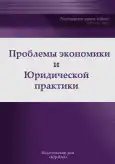The Modernization the TOPSIS Method to Assess the Sustainability of the Functioning of Industrial Enterprises in Modern Conditions
- Authors: Baldin K.V.1, Aliev A.T.1, Perederyaev I.I.2
-
Affiliations:
- All-Russian Research Institute «Center»
- OANO HE MPSU—Moscow Psychological and Social University
- Issue: Vol 19, No 3 (2023)
- Pages: 274-280
- Section: Management
- URL: https://journals.eco-vector.com/2541-8025/article/view/568468
- EDN: https://elibrary.ru/JKIFBU
- ID: 568468
Cite item
Abstract
The need for the formation of mechanisms for the sustainable development of enterprises of the industrial complex of Russia can hardly be overestimated both from the standpoint of importance and relevance. The analysis of existing works on this problem has shown insufficient knowledge in the aspect of the choice and methods of assessing indicators of sustainable development at the level of an industrial enterprise. The unavoidable use of qualitative indicators makes the use of expert methods no alternative, leads to blurring (fuzziness) of the assessment of the integral indicator. Under these conditions, the role of mathematical methods and models that fully take into account the above-mentioned features of determining the sustainability of the development of an industrial enterprise increases.
Full Text
About the authors
Konstantin V. Baldin
All-Russian Research Institute «Center»
Author for correspondence.
Email: kvbaldin@mail.ru
ORCID iD: 0000-0002-1365-5802
Dr. Sci. (Econ.), Professor; Professor, Training Department of the Graduate School
Russian Federation, MoscowAdik T. Aliev
All-Russian Research Institute «Center»
Email: alievadik@mail.ru
ORCID iD: 0000-0002-5272-3898
Dr. Sci. (Econ.), Professor; Professor, Training Department of the Graduate School
Russian Federation, MoscowIgor I. Perederyaev
OANO HE MPSU—Moscow Psychological and Social University
Email: mpsi@bk.ru
Cand. Sci. (Econ.), Associate Professor
Russian Federation, MoscowReferences
- Antamoshkin O. A. Decision support system based on multiattributive methods // Bulletin of SibGAU. 2009. 4(25). pp. 69–71.
- Barkanov A. S. Problems of ensuring sustainable functioning and strategic development of construction industry enterprises: diss. ... Doctor of Economics: 08.00.05. M., 2008. URL: http://dislib.ru/ekonomika/9733-1-problemi-obespecheniya-ustoychivogo-funkcionirovaniyastrategicheskogo-razvitiya-predpriyatiy-stroitelnoy-otrasli.php (date of reference: 02.03.2023).
- Baranov A. V. Methods and tools for ensuring sustainable innovative development of industrial enterprises: abstract. diss. ... Candidate of Economic Sciences: 08.00.05. SPb., 2013. 19 p.
- Bekrenev I. V., Lozovskaya Ya. N. Methodological aspects of the formation of the mechanism of sustainable development of the enterprise on the basis of a targeted integrated approach // Bulletin of the RUDN. Series: Economics. 2017. Vol. 25. No. 2. pp. 233–241.
- Didenko E. S. Management of sustainable development of industrial complex enterprises in conditions of increased uncertainty. diss. ... Candidate of Economic Sciences: 08.00.05. Stavropol —2022.
- Katkova N. V., Matushevskaya E. A. Methodological and practical aspects of determining the integral indicator of the level of economic stability of industrial enterprises // BIZNES INFORM. 2015. No. 1. pp. 252–257.
- Kobrinsky N. E., Maiminas E. Z., Smirnov A. D. Economic cybernetics. Moscow: Ekonomika, 1982. 408 p.
- Kozlov V. A., Danchenok L. A. Problems of sustainability management of development and functioning of entrepreneurial organizations: Monograph. Moscow: MESI. 2012. 118 p.
- Konyashova A.V. Indicators of evaluation of functional components of economic sustainability of enterprise development // Bulletin of Chelyabinsk State University. 2013. № 8 (299). Economy. Issue 40. pp. 123–128.
- Koryakov A. G. Methodological issues of sustainable development of enterprises // Issues of economics and law. 2012.
- Lyaskovskaya E. A. Management of innovative development of the enterprise by indicators of sustainability: abstract. diss. ... Doctor of Economics: 08.00.05. Chelyabinsk, 2009. 42 p.
- Mammadova M. G., Dzhabrailova Z. G. Multi-criteria optimization of human resource management tasks based on the modified TOPSIS method // Eastern European Journal of Advanced Technologies. 2015. 2/4 (74). pp. 48–61.
- Persky Yu. K., Lepikhin V. V., Semenova E. V. Methods and models for assessing an industrial enterprise as a sustainable system // Bulletin of Perm University. The series «Economics». 2015. No. 1 (24). pp. 103–110.
- Strokov V. V. Organizational and economic stability of a knowledge-intensive engineering enterprise: the formation of an integral indicator // Engineering Journal: Science and Innovation. 2012. No. 11. pp. 199–211.
- Khomyachenkova N. A. Methodology of multicriteria classification of industrial enterprises by groups of sustainable development // Bulletin of Tver State University. Series: Applied mathematics. 2010. No. 4 (37). pp. 81–96.
- Khudyakova T. A. Analysis of modern scientific approaches to the construction of an integral indicator of enterprise sustainability. https://www.researchgate.net/publication/316918417.
- Shkarupeta E. V., Dudareva O. V. Conceptual representation of the industrial ecosystem during the evolution of sustainable development // Digital and branch economy. 2021. No. 1. pp. 5–8.
- Anand M. B., Vinodh S. (2018) Application of fuzzy AHP—TOPSIS for ranking additive manufacturing processes for microfabrication // Rapid Prototyping Journal. Vol. 24. № 2. P. 424–435. DOI: 10.11O8/RPJ-10-2016-0160.
- Halicka K. (2020) Technology Selection Using the TOPSIS Method. Foresight and STI Governance, vol. 14, no 1, pp. 85–96. doi: 10.17323/25002597.2020.1.85.96.
- Hwang, C. L., Yoon K. Multiple attributes decision making methods and applications. Berlin, Springer-Verlag Berlin Heidelberg. 1981. 269 p. doi: 10.1007/978-3-642-48318-9.
- Jiri M. (2018) The robustness of TOPSIS results using sensitivity analysis based on weight tuning // IFMBE Proceedings. Vol. 68. № 2. P. 83–86. doi: 10.1007/978-981-10-9038-7_15.
Supplementary files








